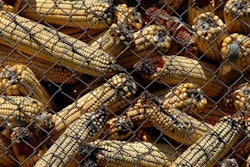Ground was broken on Aug. 31 as the first step in replacing Iowa State University’s aging poultry science facilities, made possible by private funding from Iowa agricultural donors.
The new complex will be called the Robert T. Hamilton Poultry Teaching and Research Farm in honor of the Iowa Falls farmer who, with his wife Arlene, worked to build a successful poultry and hog operation and are considered pioneers of the modern layer chicken industry. Robert Hamilton died in 2014 at the age of 90.
“The Hamilton Poultry Teaching and Research Farm will be a modern, state-of-the-art place where we’ll begin writing a new chapter of Iowa State poultry science,” said Joe Colletti, interim endowed dean of the College of Agriculture and Life Sciences at Iowa State. “The facility will help us provide the best hands-on educational experiences for students and the infrastructure required for new scientific discoveries.”
The $5 million project, which is expected to be completed in late 2019, was made possible by three donors with Iowa connections. A lead gift of $3 million was pledged by Arlene Hamilton and the Robert and Arlene Hamilton Charitable Foundation. The Iowa Egg Council pledged $1.5 million. Hy-Line International and Hy-Line North America pledged $500,000.
Pending Iowa Board of Regents approval, portions of the farm’s new facility will be officially named the Iowa Egg Council Layer Research Wing and the Hy-Line Genetics Research Wing.
“This research facility will offer much improved facilities and provides our poultry and egg farmers a terrific resource for important and relevant work,” said Kevin Stiles, executive director of the Iowa Poultry Association and Iowa Egg Council. “We also see the farm as a tremendous asset to the university and students who will later become an integral part of our poultry and egg farming operations across the state and throughout the Midwest.”
The project will be built south of Ames on the same site as the university’s existing Poultry Science Farm, and will replace buildings dating back to the early 1960s.
The new facility will accommodate educational and research needs in breeding and genetics, housing systems, flock management, nutrition, food safety and microbiology, behavior and welfare, flock health, animal health and well-being, environmental impact and economic efficiency.
It will feature modern production systems that reflect current industry practices, and will have the flexibility to adapt to emerging production systems.
The new farm will have enhanced biosecurity measures of modern poultry farms to maximize animal well-being and health, food safety and environmental conditions for air quality and water quality.
The farm will be used by students and scientists from several departments and programs, including the Department of Animal Science, Department of Agricultural and Biosystems Engineering, Department of Food Science and Human Nutrition, Department of Agronomy, College of Veterinary Medicine and scientists with the USDA’s Agricultural Research Service.
It also will be an important site for use by the Egg Industry Center at Iowa State University. The center focuses on providing value to the U.S. egg industry through information dissemination and collaborative research. The center is committed to ensuring that current and future needs of the nation’s egg industry can be answered through sound science-based information.
The Robert and Arlene Hamilton Charitable Foundation is led by the Hamilton’s son, Scott, who earned his bachelor’s degree from Iowa State in animal science and agronomy.
The Iowa Egg Council seeks to increase the value and consumption of eggs and egg products through research, innovation and science-based education. The organization partners with others to understand and meet the evolving consumer needs of eggs and egg products. It also offers educational opportunities to consumers on egg production, animal care, food safety, biosecurity and environmental issues.
Founded in 1936 by Henry A. Wallace, Hy-Line was the first poultry breeding company to apply the principles of hybridization to commercial layer breeding. Today Hy-Line International continues to be a pioneer as the first company with its own in-house molecular genetics team leading the industry in application of DNA-based technology to its breeding and genetics program. Hy-Line produces and sells both brown and white egg stock to more than 120 countries worldwide and is the largest selling layer in the American egg industry and around the world.

















